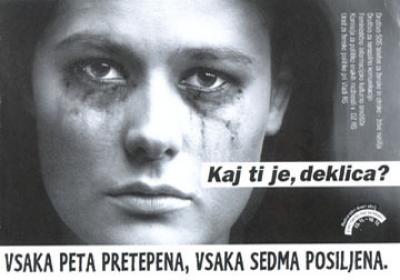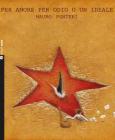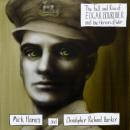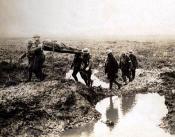Kaj ti je deklica,
da si tak žalostna ?
Kaj mi je, nič mi ni,
srce me boli.
Fantič na vojsk' leži,
fantič, oj vstani mi.
Kak' čem jaz vstati,
k' me krogla teži.
Oblekla bom črn gvant,
saj to je bil moj fant,
saj to je bil moj fant,
k' zdaj mrtev leži.
Na grob njegov bom vandrala,
na grob njegov bom sama šla,
tam bodem sanjala,
vse kar sva si b'la.
da si tak žalostna ?
Kaj mi je, nič mi ni,
srce me boli.
Fantič na vojsk' leži,
fantič, oj vstani mi.
Kak' čem jaz vstati,
k' me krogla teži.
Oblekla bom črn gvant,
saj to je bil moj fant,
saj to je bil moj fant,
k' zdaj mrtev leži.
Na grob njegov bom vandrala,
na grob njegov bom sama šla,
tam bodem sanjala,
vse kar sva si b'la.
Language: Italian
Traduzione italiana di Riccardo Venturi
9 maggio 2016 13:15
Video girato da Chiara Matej nel cimitero di Prošek/Prosecco e dedicato ai caduti triestini del 97. Regiment.
Voce: Martina Feri
Violino: Cristina Verità
Contrabbasso: Andrea Zullian
9 maggio 2016 13:15
Video girato da Chiara Matej nel cimitero di Prošek/Prosecco e dedicato ai caduti triestini del 97. Regiment.
Voce: Martina Feri
Violino: Cristina Verità
Contrabbasso: Andrea Zullian
COS'HAI, RAGAZZINA
Cos'hai, ragazzina
Ché sei tanto triste?
Cos'ho, non ho niente,
Ho male al cuore.
Il mio ragazzo è caduto in guerra,
Ragazzo mio, su, riàlzati per me.
Come e dove rialzarmi?
Una pallottola mi opprime.
Mi vestirò a lutto,
Certo lui è stato il mio ragazzo,
Certo lui è stato il mio ragazzo
E adesso giace morto.
Sulla sua tomba vagherò,
Alla sua tomba da sola andrò,
E là sognerò tutto ciò
Che noi due siamo stati.
Cos'hai, ragazzina
Ché sei tanto triste?
Cos'ho, non ho niente,
Ho male al cuore.
Il mio ragazzo è caduto in guerra,
Ragazzo mio, su, riàlzati per me.
Come e dove rialzarmi?
Una pallottola mi opprime.
Mi vestirò a lutto,
Certo lui è stato il mio ragazzo,
Certo lui è stato il mio ragazzo
E adesso giace morto.
Sulla sua tomba vagherò,
Alla sua tomba da sola andrò,
E là sognerò tutto ciò
Che noi due siamo stati.
Language: English
English adaptation by Riccardo Venturi
May 9, 2016, 13:59
May 9, 2016, 13:59
WHAT'S UP, YOUNG GIRL
Tell me, what's up, young girl,
Tell me, why are you so sad?
What's up? Nothing, I tell you,
My heart is so sad with pain.
Oh, my sweetheart fell in war,
Now my boy, rise up for me.
How and where could I rise up?
A bullet is oppressing me.
So, black clothes I'll wear on,
Sure he was my sweetheart,
Sure he was my sweetheart
And now he lies dead.
And I'll wander on his grave,
I'll go there all alone,
And there I'll lie dreaming
Of all what we two have been.
Tell me, what's up, young girl,
Tell me, why are you so sad?
What's up? Nothing, I tell you,
My heart is so sad with pain.
Oh, my sweetheart fell in war,
Now my boy, rise up for me.
How and where could I rise up?
A bullet is oppressing me.
So, black clothes I'll wear on,
Sure he was my sweetheart,
Sure he was my sweetheart
And now he lies dead.
And I'll wander on his grave,
I'll go there all alone,
And there I'll lie dreaming
Of all what we two have been.
Language: French
Version française – QU’AVEZ-VOUS, MADEMOISELLE ? – Marco Valdo M.I. – 2016
D’après la version italienne de Riccardo Venturi d’une
Chanson populaire slovène – Kaj ti je deklica – anonyme – 1914-18

« Qu’avez-vous, mademoiselle / Pourquoi êtes-vous triste ? / Ce n’est rien, une douleur, /J’ai mal au cœur. / Mon ami est tombé à la guerre,». Ainsi cette chanson populaire slovène de l’époque de la « Grande Guerre » qui doit être, sans aucun doute, comptée parmi les plus belles et les plus émouvantes de tout le conflit, toutes langues considérées. De la chanson sont usuellement chantées seulement les premières trois strophes, et en ordre varié, sauf la première qui reste toujours en tête. La dernière strophe est presque toujours omise. [RV]
D’après la version italienne de Riccardo Venturi d’une
Chanson populaire slovène – Kaj ti je deklica – anonyme – 1914-18

« Qu’avez-vous, mademoiselle / Pourquoi êtes-vous triste ? / Ce n’est rien, une douleur, /J’ai mal au cœur. / Mon ami est tombé à la guerre,». Ainsi cette chanson populaire slovène de l’époque de la « Grande Guerre » qui doit être, sans aucun doute, comptée parmi les plus belles et les plus émouvantes de tout le conflit, toutes langues considérées. De la chanson sont usuellement chantées seulement les premières trois strophes, et en ordre varié, sauf la première qui reste toujours en tête. La dernière strophe est presque toujours omise. [RV]
QU’AVEZ-VOUS, MADEMOISELLE ?
Qu’avez-vous, mademoiselle
Pourquoi êtes-vous triste ?
Ce n’est rien, une douleur,
J’ai mal au cœur.
Mon ami est tombé à la guerre,
Mon ami, relève-toi pour moi.
Comment et où me relever ?
Une balle m’emporta.
Je me vêtirai de noirs habits,
Vrai, il a été mon ami,
Vrai, il a été mon ami
Et maintenant mort, il gît.
Sur sa tombe je vaguerai,
À sa tombe, j’irai toute seule
Et là je rêverai de tout ce que
Nous deux, nous avons été.
Qu’avez-vous, mademoiselle
Pourquoi êtes-vous triste ?
Ce n’est rien, une douleur,
J’ai mal au cœur.
Mon ami est tombé à la guerre,
Mon ami, relève-toi pour moi.
Comment et où me relever ?
Une balle m’emporta.
Je me vêtirai de noirs habits,
Vrai, il a été mon ami,
Vrai, il a été mon ami
Et maintenant mort, il gît.
Sur sa tombe je vaguerai,
À sa tombe, j’irai toute seule
Et là je rêverai de tout ce que
Nous deux, nous avons été.
Contributed by Marco Valdo M.I. - 2016/5/11 - 19:44
"Kaj ti je deklica?" - Un aggiornamento ai tempi d'oggi (e a ogni tempo)
Chi ha detto che le vecchie canzoni popolari non sono più "attuali"? Il seguente esempio proviene da una campagna di denuncia e sensibilizzazione in atto nella Repubblica di Slovenia:

Come si può vedere, la "deklica" di oggi non piange affatto per il fidanzato morto in guerra, bensì per qualche fidanzato (o marito, o familiare, o chicchessia) che la picchia e la stupra, con tanto di cifre statistiche. Cosa che, si può starne certi, avveniva regolarmente anche ai tempi delle antiche canzoni popolari.
Chi ha detto che le vecchie canzoni popolari non sono più "attuali"? Il seguente esempio proviene da una campagna di denuncia e sensibilizzazione in atto nella Repubblica di Slovenia:

"Che cos'hai, ragazzina? Una ogni cinque picchiata, una ogni sette stuprata"
Come si può vedere, la "deklica" di oggi non piange affatto per il fidanzato morto in guerra, bensì per qualche fidanzato (o marito, o familiare, o chicchessia) che la picchia e la stupra, con tanto di cifre statistiche. Cosa che, si può starne certi, avveniva regolarmente anche ai tempi delle antiche canzoni popolari.
Riccardo Venturi - 2016/5/12 - 05:47
×
![]()
Note for non-Italian users: Sorry, though the interface of this website is translated into English, most commentaries and biographies are in Italian and/or in other languages like French, German, Spanish, Russian etc.








Canzone popolare slovena
Slovenska narodna pesem
Slovenian folksong
Interpretata dall'Oktet Mi con arrangiamento di Ciril Vremšak
« Cos’hai ragazzina, perché sei così triste / Che cos’ho? Nulla. Ho male al cuore / il mio ragazzo è caduto in guerra». Così questa canzone popolare slovena dell'epoca della "Grande Guerra" che deve essere, senz'altro, annoverata tra le più belle e commoventi dell'intero conflitto, e in ogni lingua. Della canzone vengono usualmente cantate solo le prime tre strofe, e in ordine vario fatta salva la prima che rimane sempre tale. L'ultima strofa è quasi sempre tralasciata. [RV]
„What's up, young girl, why are you so sad? / What's up? Nothing. My heart is so sad / my sweetheart fell in war“. So says this Slovenian folksong from the „Great War“, that should no doubt be included among the most beautiful and moving songs of the entire war, in any language. Only the first three verses of she song are commonly sung, often interchanged provided the first verse is always in the same position. The last (4th) verse is nearly always neglected. [RV]